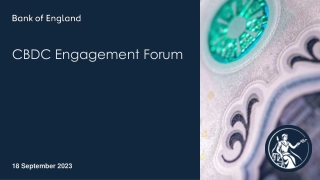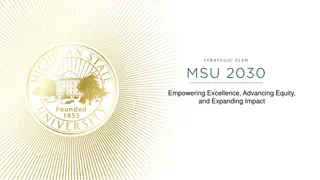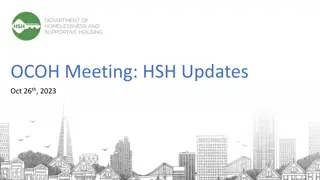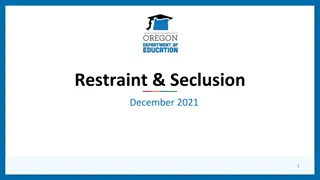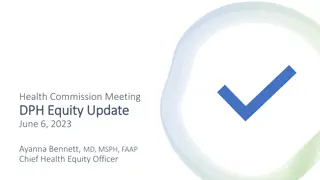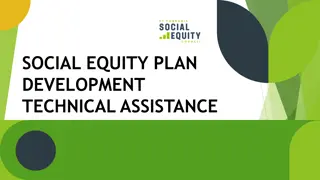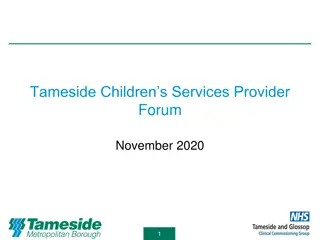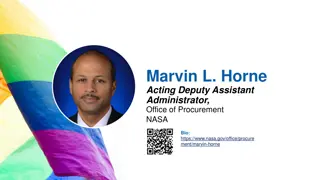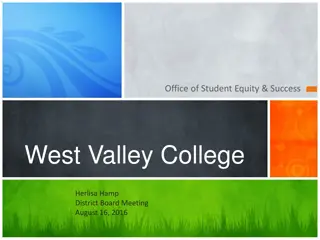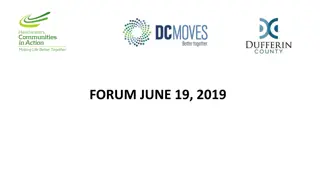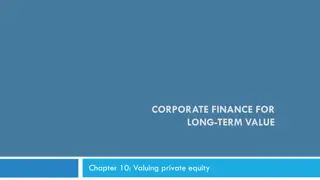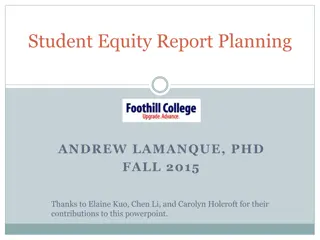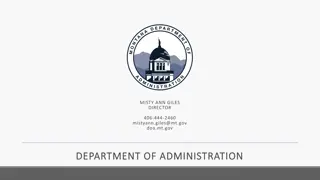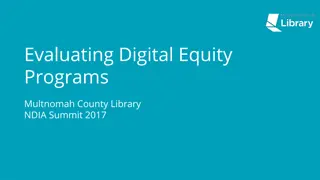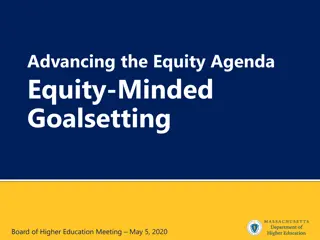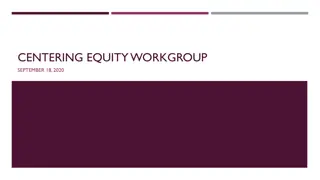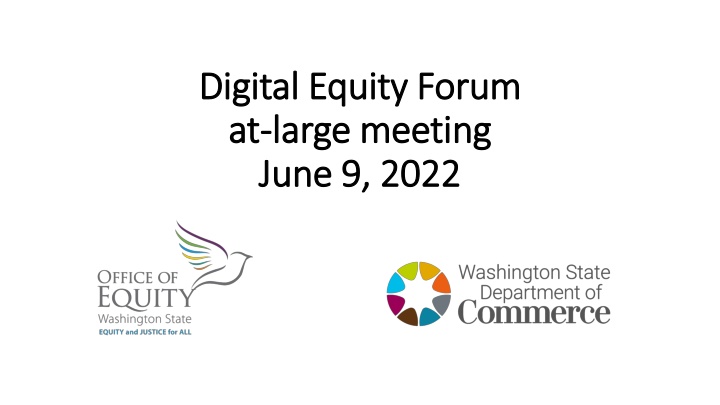
Digital Equity Forum Meeting Highlights
The goals and outcomes of the recent Digital Equity Forum meeting, including updates on mission, vision, and values, engagement strategies, public comments, and key discussions. Learn how members are working together to promote digital equity and drive future initiatives.
Download Presentation

Please find below an Image/Link to download the presentation.
The content on the website is provided AS IS for your information and personal use only. It may not be sold, licensed, or shared on other websites without obtaining consent from the author. If you encounter any issues during the download, it is possible that the publisher has removed the file from their server.
You are allowed to download the files provided on this website for personal or commercial use, subject to the condition that they are used lawfully. All files are the property of their respective owners.
The content on the website is provided AS IS for your information and personal use only. It may not be sold, licensed, or shared on other websites without obtaining consent from the author.
E N D
Presentation Transcript
Digital Equity Forum Digital Equity Forum at at- -large meeting large meeting June 9, 2022 June 9, 2022
Todays Meeting Goals Today s Meeting Goals Review member input received in April including revised Mission, Vision and Values. Learn about the Washington State Broadband Office s programs and how the Digital Equity Forum will help to inform future efforts. Report to members on what we have heard from community listening sessions and small group workshops to date. Communicate the process Forum members will use in summer workshops to develop recommendations for the final report.
Welcome and Acknowledgments Welcome and Acknowledgments Dr. Karen A. Johnson (she/her/Beloved), Co-chair, Director, Washington State Office of Equity Mark Vasconi (he/him), Co-chair, Director, Washington State Broadband Office 3
How to Participate in Todays Public Comment Period How to Participate in Today s Public Comment Period To ensure everyone s voice is heard today: Please use the raise hand tool in Zoom if you would like to speak during this designated public comment period. Our moderators will recognize you. If you are unable to speak, please use the Q&A feature to comment during the public comment period. We will pause and open the floor to participants joining by telephone and ASL users to provide comments. A diversity of opinions and voices is encouraged. Please allow others to speak without interruption. Please focus on your own experiences and do not speak for others unless they have given you permission. Following public comment period, please submit comments to digitalequity@commerce.wa.gov 4
Public Comment Public Comment 5
Introductions Introductions 6
Follow ups from April 7 Added member list to website Work program Definitions Updated Mission, Vision, and Values Timeline Request to hear more about how this work fits in with WSBO programs overall
Mission, Vision, and Values Mission, Vision, and Values 8
Mission, Vision, and Values Reviewed and incorporated feedback from April 7 at-large meeting. The Digital Equity Forum workplan is a living and breathing resource.
Mission The mission of the Digital Equity Forum is to develop recommendations to advance digital connectivity in Washington state. In developing its recommendations, the forum must: Develop goals that are consistent with the goals of the governor's statewide broadband office, as provided in RCW 43.330.536 By 2024: 25/3 megabits per second (Mbps) scalable By 2026: 1/1 gigabit per second (Gbps) all anchor institutions By 2028: 150/150 Mbps all residents and businesses Strengthen public-private partnerships Solicit public input through public hearings or informational sessions Work to increase collaboration and communication between local, state, and federal governments and agencies Recommend reforms to universal service mechanisms.
Vision Everyone in Washington has affordable broadband internet technology as well as the tools and skills needed to participate in our digital society before 2028.
Values (page one) The Digital Equity Forum provides recommendations that: Center community voice. Develop, strengthen, or support policies, programs and procedures that prioritize resources to people who experience the effects of past and current marginalization. Eliminate barriers that have been deeply entrenched in systems of inequality and oppression. Promote dignity, honor, and respect for all people. Ensure economic viability of both urban and rural communities in Washington state. Support the needs for all who call Washington home.
Values (page two) The Digital Equity Forum provides recommendations that: Address access to affordable, reliable, redundant and scalable/future-proof broadband technologies to engage in essential services. Promote values in systems that sustain equity, not just systems that provide equity in the moment. Prioritize education and life-long learning through the addressing of digital inequities. Consider online safety and security and the costs that anchor institutions like schools, libraries and healthcare must bear. Recognize that just because a service may be available, it may not mean that everyone has the ability to access it.
Meeting Break Meeting Break 14
Updates from WSBO Updates from WSBO 15
Why are we here today? The goal is Universal Service
Universal service mechanisms What is Universal Service? Principal that all households in America should have access to communications services Historically focused on supporting affordability and availability of standard phone service and recently cellular service How was it funded? Funded by fees on phone bills, higher rates for standard business services Supports affordability programs and rural network expansion for standard phone service, cellular service and some broadband some service expansion Broadband funding has been insufficient to expand service to all in America Broadband affordability has only recently been supported by federal programs for devices or service Affordable Connectivity Program (www.affordableconnectivity.gov) Many ISPs also offer discounted services that provide low-cost options
Challenges to universal service Current Situation Large gaps in affordability, network infrastructure, adoption and digital literacy New federal funding and programs will help but sustainability will require a long term commitment to digital equity Current Challenge State and/or federal action is essential to insure that networks are maintained and expanded and that affordability and adoption measures continue Regulating broadband as a utility? User tax arrangement like that which supported plain old voice service may be needed
Current programs: Federal resources Infrastructure Acceleration Grants Since fall of 2021, WSBO has awarded $175 million to 18 projects serving more than 28,000 locations with broadband internet. Equity and Affordability Grants (coming soon) $5 million available and to be awarded for unserved areas of the state in partnership with Office of Equity A second funding cycle for $120 million funding cycle began in June 2022.
Current programs: State resources State matching grants of federal funding opportunities This program has been continuously open since Nov. 2021 $50 million in state funds available with individual grants of up to $5 million or 25% of the total federal funding request. $133 million in pending federal applications from federal Tribal Connectivity Grants. Award decision expected this summer.
Current digital equity program overview: State resources Digital Navigator Program Estimated that the program will serve over 30,000 Washington residents by June 30th, 2022, at an average cost of $250 per resident served including WSBO administrative fee. Services provided by June 30th, 2022 include: Digital Navigation Digital Skills Training Distribution of over 4,000 laptops, tablets, or smartphones Over 4,660 individuals/households provided with subscription assistance Grantees: Equity In Education Coalition, Goodwill, Community Health Network of Washington, Seattle Housing Authority
Infrastructure Investment and Jobs Act Internet for All Broadband Equity, Access and Deployment (BEAD)* A program to get all Americans online by funding partnerships between states or territories, communities, and stakeholders to build infrastructure where we need it to and increase adoption of high-speed internet. Digital Equity Act* Three programs that provide funding to promote digital inclusion and advance equity for all. They aim to ensure that all communities can access and use affordable, reliable high-speed internet to meet their needs and improve their lives. Middle Mile* Expand middle mile infrastructure, to reduce the cost of connecting unserved and underserved areas. Middle mile infrastructure broadly refers to the mid-section of internet infrastructure that carries large amounts of data at high speeds over long distances. Affordable Connectivity Program This program helps those in need pay for high-speed internet service and technology. *Final funding amounts for the State of Washington are still being determined
Digital Equity Act HB 1723 State Digital Equity Plan Washington State Broadband Office to develop a Digital Equity Plan in consultation with key partners including the Digital Equity Forum Digital Equity Opportunity Program Grants for organizational and capacity building and community technology programs Digital Equity Planning Program Grants for local governments, workforce organizations, institutions of higher- education, and others to develop digital equity plans for a discrete region Coordinated outreach to underserved communities about available broadband programs
Leading with equity Digital Equity Forum Co-convening in partnership with the Governor s Office of Equity Listening to community perspectives Additional responsibilities under the Digital Equity Act Makes Digital Equity Forum a permanent body Duties include advisory review of grant applications for Digital Equity Opportunity Program and the Digital Equity Planning Grant Program Biannual report to the legislature
State Digital Equity Planning Timeline Digital Equity Forum Develops Recommendations for the Legislature Digital Equity Forum June November 2022 Bipartisan Infrastructure Law Planning Efforts Plan Planning Initiation Plan Completion Development Fall 2023 Fall 2022
Community Engagement Update Community Engagement Update 26
How We Listened and Learned 1. Community Listening & Learning Sessions (~95 participants) March 29, March 30, May 10, and May 11 2. Digital Equity Forum Small Group Workshops (~20 participants) February 24 and March 24 3. Direct emails to Washington State Broadband Office
From Listening and Learning to Recommendations While analyzing what we heard, the key priority and responsibility was to prioritize participants lived experiences. Similar statements are grouped together, and there s a focus on creating labels for these groups and themes that use the ideas and words that participants used. The emerging themes, community engagement logs, and survey data are the materials that will be used in the July and August small group workshops where recommendations are developed (July) and then refined (August).
Emerging Themes Too few internet service provider options. Participants described situations where they only had a single option for an internet service provider, and the belief that more options would have a positive impact. I would like to spend more money to have a better connection but there is only one option that is no good. Need for basic minimum service standards. Participants shared the negative impacts that comes from what they perceived and described as the internet service providers being able to choose the quality of service they provided. It doesn t seem fair. Why can t there just be a guarantee that you ll get a certain level of service at a certain price - no matter where you live?
Emerging Themes Affordability is an issue, but quality of service (reliability and stability) is equally important. I pay for the highest tier service available, but it still goes in and out. There are certain things, like work and important stuff, where I have learned I can t do it from home because I might get embarrassed or look bad to my boss. I have to go to my office or go to the library, even though I m paying nearly $100 per month for my internet. Digital literacy and skills training is needed. It s not enough to just give people an internet connection many of those people who haven t had a connection have no idea what to do once they re connected. If we can help new users better understand the internet, then we will lower rates of exploitation, fraud, and online scams. There are people with amazing ideas in their minds that can have a huge impact if we help them better understand how to act on those ideas in a digital space.
Emerging Themes Accessibility must be a focus More and more governments are putting forms and service stuff online, but almost every single government website is different. Is there some way there can be a standard where if you know one website you understand them all or at least generally know how to get around? Not just websites, but the approaches and services surrounding the internet. I cannot tell you whether or not the light is blue or red. Mobile devices are just as important as desktops and laptops It doesn t really matter to me and my family and most of my friends what kind of service is coming into the house, other than the speed I can get on my phone and in my hotspot. In rural and some communities with more poverty, the only way people are connecting is with their cellphone and maybe a hotspot to a tablet.
Meeting Break Meeting Break 32
Emerging Themes Government must have a larger and more impactful role. We cannot just leave this to consumers and people who get angry enough to complain on the phone. These companies make a lot of money and government is the only group with enough power to make them give us the service we need for modern life. Need a more accurate understanding of of digital connectivity in WA The connectivity maps just aren t true, so they give the providers a way to say they are doing better than they are actually doing. If you listen to the internet companies, you d think we have some of the best internet access in the U.S., but that s simply not true. Unless we get an accurate picture of where we stand, then it s just not realistic to think anything will change.
Emerging Themes Cultural awareness is needed Must avoid making assumptions about communities needs. There needs to be a cultural lens for designing the trainings and the use of trusted partners with empathy, credibility, understanding, and similar demographics when looking to grow internet access and digital literacy in areas that are highly disconnected right now. Success will require all sectors to be involved Need for partnerships with community-based organizations that have a better understanding of specific needs and can also be technology hubs for learning, training, skills development, triaging issues, and hardware. Don t forget about organizations that need better connectivity Let s not just focus on individuals we need to remember our small businesses and nonprofits that might also not know the best ways to use the internet for their benefit.
Emerging Themes Internet service quality has not kept pace with people s expectations and needs. Participants discussed the increasing availability of online forms by public sector organizations and telehealth offerings, but how those efforts could be diluted or undermined when people didn t have a strong and/or reliable internet connection. Not having a strong or reliable connection means you might not get hired, you might not get the promotion, or you might not be able to work from home. I think it s great that my representative will meet with his constituents over Zoom, but it felt horrible when my connection dropped during two separate meetings I had scheduled with him.
What are we missing? Based on your experiences (personal and professional) and expertise, what else needs to be added?
Community Survey Developed based on the expertise of the WSBO and the WSOE. Will be available in 17 languages, including American Sign Language videos for each question. Options to receive in large print or braille (English and Spanish) formats will be available. Accessibility review and testing are ongoing. Expected to go live in the next two weeks. Asking for your assistance to help us promote the survey in your communities and your networks.
Recommendations Development Framework Recommendations Development Framework 38
Recommendations Development Overview Recommendations Refinement Small Group Workshops Recommendations Development Small Group Workshops At-Large Meeting (June 9) (July 14 & 20) (August 10 & 17) At-Large Meeting State Broadband Office and Office of Equity Draft Report to the Legislature At-Large Meeting (September 15) Final Recommendations (October December) (October 20) Key input for future Digital Equity Planning
From Listening and Learning to Recommendations Recommendations Development Small Group Workshops (July) Digital Equity Forum members are provided the community engagement data (log, emerging themes, and survey data) in advance of the meeting. Groups of 2-3 members will go to breakout rooms and start developing first draft recommendations based on the community engagement data and their own experiences and expertise. Intermittently, members will come back to the primary room and report out, with a focus on trying to create a diversity of recommendations. Recommendations will be captured through a combination of note taking by small group members and workshop facilitators.
From Listening and Learning to Recommendations Recommendations Refinement Small Group Workshops (August) Digital Equity Forum members are provided the compiled first draft recommendations from the Recommendations Development Small Group Workshops, as well as a survey data update. Groups of 2-3 members (ideally the same as the previous groups) will go to breakout rooms and start refining draft recommendations. Intermittently, members will come back to the primary room and report out, with a focus on trying to create a diversity of refined recommendations. Refined recommendations will be captured through a combination of note taking by small group members and workshop facilitators. Each small group will select a spokesperson whose responsibility will be to present the refined recommendations at the September 15 at-large meeting.
From Listening and Learning to Recommendations Working to a recommendation Theme Too few internet service provider options Draft Recommendation (July Small Group Workshops) Revise regulations to allow for more competition. Pass legislation to allow more municipal networks. Refined Recommendation (August Small Group Workshops) Legislative and legal barrier to municipal networks need to be removed, and not just for businesses.
Recommendations Development Schedule June 9 (at-large meeting) Community Engagement Data Update July 14 (Group A) and July 20 (Group B) Recommendations Development Small-Group Workshops July and August WSBO, WSOE, and The Athena Group consultants will compile and group initial recommendations from July workshops. August 10 and August 17 Recommendations Refinement Small-Group Workshops August and September WSBO, WSOE, and The Athena Group consultants will compile and group recommendation refinements from August workshops.
Recommendations Development Schedule September 15 (at-large meeting) Refined recommendations will be presented for feedback by Small Group spokespeople. September and October WSBO, WSOE, and The Athena Group consultants will process feedback from September at-large meeting. October 20 Digital Equity Forum members will finalize recommendations. October, November, and December WSBO and WSOE will integrate the recommendations into the Digital Equity Forum report that will be sent to the Legislature.
Next Steps Next Steps 45
Next steps Forum members will be asked to join one of two small group work sessions in the coming days. Reminder, Forum Members are asked to attend both meetings, preferably in the same group during both meetings. Helping us create awareness about the Community Survey.
Closing Remarks and Adjournment Closing Remarks and Adjournment Dr. Karen A. Johnson(she/her/Beloved), Co-chair, Director, Washington State Office of Equity Mark Vasconi (he/him), Co-chair, Director, Washington State Broadband Office 47

